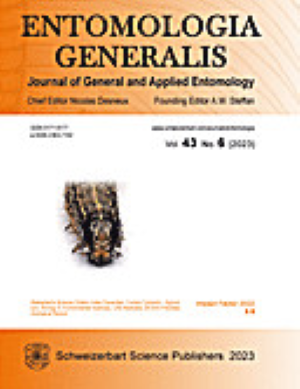A comprehensive review of entomophagy under legal, historical, safety, and nutritional profile
IF 4.6
1区 农林科学
Q1 ENTOMOLOGY
引用次数: 0
Abstract
In the last decade the use of insects has grown globally in relation to all sectors of the food chain. In about 100 nations around the world, insects are traditionally part of the human diet; this practice is termed entomophagy. Although many studies have been conducted on the importance of edible insects as alternative sources of protein, most of them have focused on consumer acceptance or aversion/neophobia. As human food, insects have various advantages. They are rich in proteins, vitamins, and minerals and can be used in nutrition. Additionally, insects are efficient in bioconverting organic matter into biomass for food, adding the advantage of disposing of some by-products. Insects as foods of the future offer great promise, and their impact is expected to grow as new insights are pursued into quality, cultivation, nutrition, taste and safety. This review aims to be an overview of the laws regulating entomophagy, the history of insect consumption worldwide, safety considerations, and nutrient composition.从法律、历史、安全和营养角度全面审视昆虫食性
近十年来,昆虫的使用在全球范围内不断增长,涉及食物链的各个环节。在全球约 100 个国家,昆虫历来是人类饮食的一部分;这种做法被称为昆虫食性。尽管已经开展了许多关于食用昆虫作为替代蛋白质来源的重要性的研究,但大多数研究都侧重于消费者的接受程度或厌恶/仇视程度。作为人类食物,昆虫有各种优势。它们富含蛋白质、维生素和矿物质,可用于营养。此外,昆虫还能有效地将有机物生物转化为生物质作为食物,还能处理一些副产品。昆虫作为未来的食品大有可为,随着人们对昆虫的质量、栽培、营养、口味和安全性有了新的认识,昆虫的影响预计会越来越大。本综述旨在概述规范昆虫食性的法律、全世界昆虫消费的历史、安全考虑因素和营养成分。
本文章由计算机程序翻译,如有差异,请以英文原文为准。
求助全文
约1分钟内获得全文
求助全文
来源期刊

Entomologia Generalis
生物-昆虫学
CiteScore
7.10
自引率
18.80%
发文量
72
审稿时长
>12 weeks
期刊介绍:
Its scope covers all aspects of basic and applied research dealing with insects and more broadly with arthropods inhabiting wild, agricultural and/or urban habitats. The journal also considers research integrating various disciplines and issues within the broad field of entomology and ecology.
Entomologia Generalis publishes high quality research articles on advances in knowledge on the ecology and biology of arthropods, as well as on their importance for key ecosystems services, e.g. as biological control and pollination. The journal devotes special attention to contributions providing significant advances (i) on the fundamental knowledge and on sustainable control strategies of arthropod pests (including of stored products) and vectors of diseases, (ii) on the biology and ecology of beneficial arthropods, (iii) on the spread and impact of invasive pests, and (iv) on potential side effects of pest management methods.
Entomologia Generalis welcomes review articles on significant developments in the field of entomology. These are usually invited by the editorial board, but proposals may be sent to the Editor-in-Chief for preliminary assessment by the editorial board before formal submission to the journal. The journal also considers comments on papers published in Entomologia Generalis, as well as short notes on topics that are of broader interest.
 求助内容:
求助内容: 应助结果提醒方式:
应助结果提醒方式:


